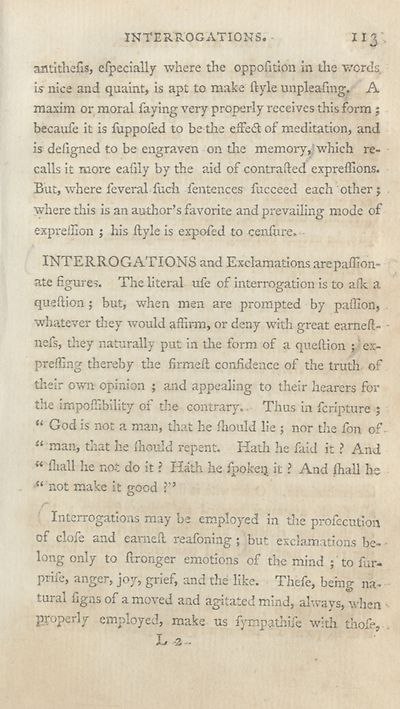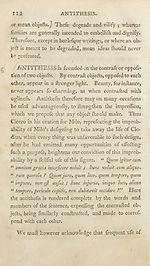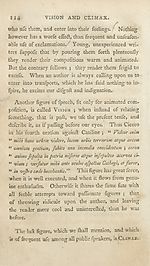Download files
Complete book:
Individual page:
Thumbnail gallery: Grid view | List view

INTERROGATIONS.
1 *3
antithefii, efpecially where the oppofition in the words,
is nice and quaint, is apt to make ftyle unpleafing. A
maxim or moral faying very properly receives this form;
becaufe it is fuppofed to be the effed of meditation, and
is defigned to be engraven on die memory,! which re¬
calls it more eafily by the aid of contrafted expreffions.
But, where feveral fuch fentences fucceed each other;
where this is an author’s favorite and prevailing mode of
expreillon j his ftyle is expofed to cenfiire.
INTERROGATIONS and Exclamations arepaffion-
ate figures. The literal ufe of interrogation is to afk a
queftion; but, when men are prompted by paffion,
whatever diey would affirm, or deny with great eameft-
nefs, they naturally put in the form of a queftion Jlex-
preffing thereby the firmeft confidence of the truth, of
their own opinion ; and appealing to their hearers for
the impoffibility of the contrary.. Thus in fcripture 5
“ God is not a man, that he fhould lie ; nor the fon of
“ man, that he ftiould repent. Hadi he faid it ? And
“ foall he not do it ? Hath he fpokeq it ? And fhall he
“ hot make it good ?”
Interrogations may be employed in die profccution
of clofe and eameft reafoning; but exclamations be¬
long only to ftronger emotions of the mind ; to fur-
prife, anger, joy, grief, and the like. Thefe, being na¬
tural figns of a moved and agitated mind, always, when
properly employed, make us fympathife with diofe,
La.
1 *3
antithefii, efpecially where the oppofition in the words,
is nice and quaint, is apt to make ftyle unpleafing. A
maxim or moral faying very properly receives this form;
becaufe it is fuppofed to be the effed of meditation, and
is defigned to be engraven on die memory,! which re¬
calls it more eafily by the aid of contrafted expreffions.
But, where feveral fuch fentences fucceed each other;
where this is an author’s favorite and prevailing mode of
expreillon j his ftyle is expofed to cenfiire.
INTERROGATIONS and Exclamations arepaffion-
ate figures. The literal ufe of interrogation is to afk a
queftion; but, when men are prompted by paffion,
whatever diey would affirm, or deny with great eameft-
nefs, they naturally put in the form of a queftion Jlex-
preffing thereby the firmeft confidence of the truth, of
their own opinion ; and appealing to their hearers for
the impoffibility of the contrary.. Thus in fcripture 5
“ God is not a man, that he fhould lie ; nor the fon of
“ man, that he ftiould repent. Hadi he faid it ? And
“ foall he not do it ? Hath he fpokeq it ? And fhall he
“ hot make it good ?”
Interrogations may be employed in die profccution
of clofe and eameft reafoning; but exclamations be¬
long only to ftronger emotions of the mind ; to fur-
prife, anger, joy, grief, and the like. Thefe, being na¬
tural figns of a moved and agitated mind, always, when
properly employed, make us fympathife with diofe,
La.
Set display mode to:
![]() Universal Viewer |
Universal Viewer | ![]() Mirador |
Large image | Transcription
Mirador |
Large image | Transcription
| Antiquarian books of Scotland > Languages & literature > Abridgement of lectures on rhetoric > (129) |
|---|
| Permanent URL | https://digital.nls.uk/135468002 |
|---|
| Description | Thousands of printed books from the Antiquarian Books of Scotland collection which dates from 1641 to the 1980s. The collection consists of 14,800 books which were published in Scotland or have a Scottish connection, e.g. through the author, printer or owner. Subjects covered include sport, education, diseases, adventure, occupations, Jacobites, politics and religion. Among the 29 languages represented are English, Gaelic, Italian, French, Russian and Swedish. |
|---|

